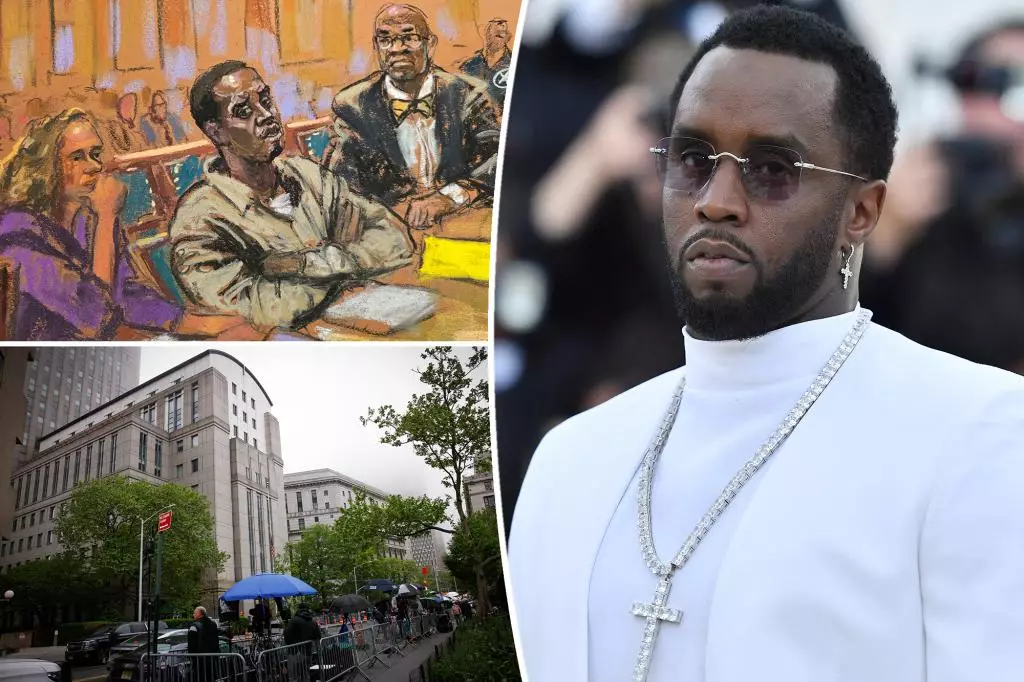As the legal drama unfolds surrounding Sean “Diddy” Combs, the world watches closely. The high-profile hip-hop mogul is about to face charges that accuse him not merely of personal misconduct but of orchestrating a systematic pattern of abuse over decades. The gravity of the situation is amplified by the fact that this case mirrors the statutory language typically associated with organized crime syndicates, lending a sinister weight to the accusations. As jury selection kicks off, one can’t help but ponder the broader implications of this case—not just for Combs, but for the entertainment industry as a whole.
The indictment against Combs portrays him as a central figure in a sprawling network of alleged sexual abuse, revealing a troubling interplay between celebrity influence and exploitation. This scenario compels a deep dive into the culture surrounding powerful figures in the entertainment world, where such behaviors have often remained shrouded in silence.
The Allegations Unfold
According to the 17-page indictment, the accusations against Diddy ascend well beyond mere personal failings. Prosecutors allege a complex scheme involving sex trafficking and racketeering, where women were allegedly coerced into participating in drug-fueled “Freak Offs.” These events, described in chilling detail, expose a troubling industry dynamic where women’s agency crumbles under the weight of fame and financial promise.
The strategy purportedly employed by Diddy is particularly alarming—leveraging career aspirations to manipulate vulnerable individuals is not just reprehensible but raises important questions about the toxicity that can flourish in the intersections of power and fame. The more these allegations surface, the clearer it becomes that even within a segment of society that prides itself on creativity and diversity, systemic issues of control and exploitation lurk beneath the glamorous surface.
The Defense and its Implications
In stark contrast to the harrowing allegations, Diddy and his legal team present a narrative of consent and misunderstanding. They paint a picture far different from the dark one conjured by prosecutors, insisting that the notorious “Freak Offs” were consensual and that violence has been exaggerated or misconstrued. This defense strategy begs the question: can the narrative of consent truly coexist with the power dynamics at play when one party holds significant sway over another’s career?
The attempt to downplay allegations of coercion illuminates an ongoing conversation about consent culture in spaces where power dynamics are imbalanced. It’s imperative to confront how celebrity status can skew perceptions of consent, often leading to tragic consequences that go unreported until they erupt into public scandal.
The Shadow of Past Transgressions
Diddy’s legal history displays a pattern that cannot be ignored—prior incidents reveal an individual who has repeatedly skirted the edges of acceptable behavior. From incidents involving altercations to brushes with the law related to violence, each chapter in his legal saga raises concerns about accountability. His admission of “toxic relationships” suggests an awareness of his personal failings and yet, fundamentally questions the extent to which individuals take responsibility for their actions in the face of fame.
This ongoing trial may be Diddy’s most serious challenge yet, with the potential for decades in prison looming ever over him. The implications extend beyond his personal plight; they resonate through the entertainment industry, calling out the need for systemic change. It serves as a crucial reminder for all sectors to establish robust frameworks of accountability, especially in empowering voices that have long been silenced.
Cultural Reflection
The impending trial of Sean Combs catalyzes a broader reflection on the culture of celebrity and accountability. As the trial unfolds, it is increasingly evident that issues of power, gender, and abuse must be at the forefront of societal discussions. Toxic behavior cannot be excused away with appeals to celebrity status; instead, the time has come for significant cultural reckoning.
In a world where the consequences of unchecked power can go unchallenged for so long, this trial may be a turning point. It compels society to reassess its responses to allegations of abuse and to value the voices of those who have been marginalized by fame. The stakes are immeasurably high, and how this narrative unfolds may set an example for how individuals grapple with the complex issues of morality and power within the public eye.


Leave a Reply